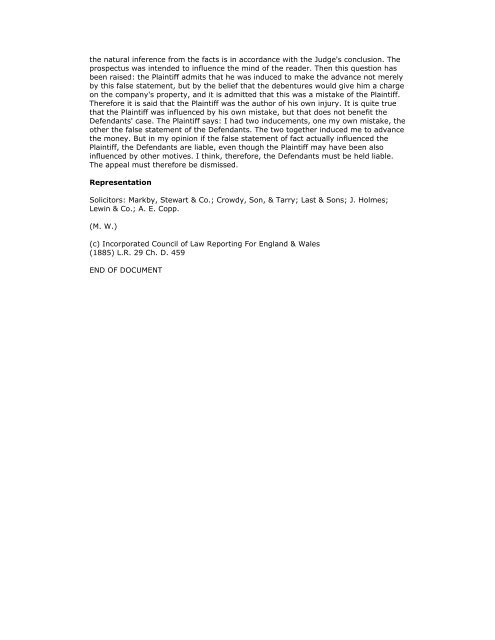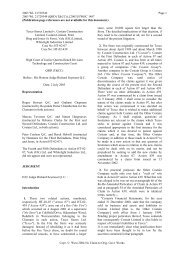misrepresentation as to the state of a man's mind is, therefore, a misstatement offact. Having applied as careful consideration to the evidence as I could, I havereluctantly come to the conclusion that the true objects of the Defendants in raisingthe money were not those stated in the circular. I will not go through the evidence,but looking only to the cross-examination of the Defendants, I am satisfied that theobjects for which the loan was wanted were misstated by the Defendants, I will notsay knowingly, but so recklessly as to be fraudulent in the eye of the law.Then the question remains--Did this misstatement contribute to induce the Plaintiff toadvance his money. Mr. Davey's argument has not convinced me that they did not.He contended that the Plaintiff admits that he would not have taken the debenturesunless he had thought they would give him a charge on the property, and thereforehe was induced to take them by his own mistake, and the misstatement in the circularwas not material. But such misstatement was material if it was actively present to hismind when he decided to advance his money. The real question is, what was the stateof the Plaintiff's mind, and if his mind was disturbed by the misstatement of theDefendants, and such disturbance was in part the cause of what he did, the mere factof his also making a mistake himself could make no difference. It resolves itself into amere question of fact. I have felt some difficulty about the pleadings, because in thestatement of claim this point is not clearly put forward, and I had some doubtwhether this contention as to the third misstatement was not an afterthought. But thebalance of my judgment is weighed down by the probability of the case. What is thefirst question which a man asks when he advances money? It is, what is it wantedfor? Therefore I think that the statement is material, and that the Plaintiff would beunlike the rest of his race if he was not *484 influenced by the statement of theobjects for which the loan was required. The learned Judge in the Court below cameto the conclusion that the misstatement did influence him, and I think he came to aright conclusion.FRY, L.J.:--I am of the same opinion. I do not think it necessary to refer to the two allegedmisstatements as to the mortgages, because I do not rely on that portion of the case.But with respect to the statement of the objects for which the debentures wereissued, I have come to the conclusion that there was a misstatement of fact, that thestatement contained in the circular was false in fact and false to the knowledge of theDefendants. Was the statement true in fact? The circular was adopted at a meeting ofthe board when all the Defendants were present. The financial state of the companywas considered. They owed £5000 to their bankers, and £5000 to Hores & Pattisson.They owed large sums to tradesmen and other persons. They were under anobligation to pay £3500 in instalments on the mortgage for £21,500 before April,1884, and they knew that if they did not pay the instalments, the whole would becalled in. The necessity of raising money must have been discussed at the meeting. Itis clear that their object in raising the money was to meet their pressing liabilities. Butthe Defendants say that the mortgage for £5000 to Hores & Pattisson was only atemporary loan, and that the greater part of it was expended in alterations andadditions to the buildings, and therefore the mortgage was merely an anticipation ofthe loan for the objects stated in the prospectus. But the statement in the prospectuswas that a large sum of money had been already expended in improving the building(and that included the greater part of the advance by Hores & Pattisson), and that thedirectors intended to apply the money raised by the debentures in further improvingthe buildings. This statement was therefore false.It is not necessary to call attention to the evidence, that the Defendants knew at thetime that a large proportion of the loan would have to be expended in paying pressingliabilities. It is hardly denied by the Defendants. I come, therefore. to the *485conclusion, with regret, that this false statement was not only false in fact, but wasfalse to the knowledge of the Defendants.The next inquiry is whether this statement materially affected the conduct of thePlaintiff in advancing his money. He has sworn that it did, and the learned Judge whotried the action has believed him. On such a point I should not like to differ from theJudge who tried the action, even though I were not myself convinced, but in this case
the natural inference from the facts is in accordance with the Judge's conclusion. Theprospectus was intended to influence the mind of the reader. Then this question hasbeen raised: the Plaintiff admits that he was induced to make the advance not merelyby this false statement, but by the belief that the debentures would give him a chargeon the company's property, and it is admitted that this was a mistake of the Plaintiff.Therefore it is said that the Plaintiff was the author of his own injury. It is quite truethat the Plaintiff was influenced by his own mistake, but that does not benefit theDefendants' case. The Plaintiff says: I had two inducements, one my own mistake, theother the false statement of the Defendants. The two together induced me to advancethe money. But in my opinion if the false statement of fact actually influenced thePlaintiff, the Defendants are liable, even though the Plaintiff may have been alsoinfluenced by other motives. I think, therefore, the Defendants must be held liable.The appeal must therefore be dismissed.RepresentationSolicitors: Markby, Stewart & Co.; Crowdy, Son, & Tarry; Last & Sons; J. Holmes;Lewin & Co.; A. E. Copp.(M. W.)(c) Incorporated Council of Law Reporting For England & Wales(1885) L.R. 29 Ch. D. 459END OF DOCUMENT
















